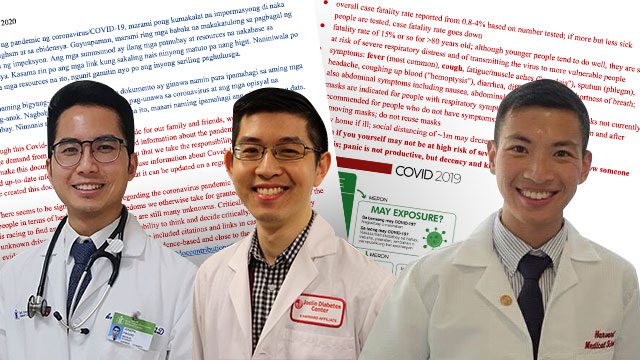SUMMARY
This is AI generated summarization, which may have errors. For context, always refer to the full article.

MANILA, Philippines – Access to timely, relevant, and correct information is critical during times like this. But when misinformation and disinformation can spread as fast as a virus, what do we do?
For young doctors Marc Gregory Yu and Joseph Paguio, and doctor-in-training Chris Dee, some battles aren’t only fought in hospitals.
To combat fake news and make truthful information more accessible and understandable to the public, the 3 came up with a shareable document or primer that contains information on the coronavirus disease (COVID-19) with useful updates from reliable sources.
The initiative was created by Dee, a graduate of molecular biophysics and biochemistry at Yale University, who is currently a medical student at Harvard University and research fellow at the Dana Farber Cancer Institute.
He got help from his colleagues, Paguio and Yu, who are both graduates from the UP College of Medicine. Paguio is training at the Memorial Sloan Kettering Cancer Center in New York City while Yu is a research fellow at the Joslin Diabetes Center and Harvard Medical School.
In a Facebook post, Dee shared the link to the document, which people can easily open in a single click. The document got around 1,500 views as of early evening Friday, March 13, and received positive feedback from netizens.
Fighting fake with truth
The 3 started the online document as an initiative to keep their own family and friends informed about the COVID-19 crisis. As days passed, they realized a public need for curated information.
“The scientific community is racing to find answers, but as of now there are still many unknowns. Critically, the pervasiveness of the unknown drives fear, which can mitigate our ability to think and decide critically,” the group said.
The many questions and answers that are still unknown about the virus make people vulnerable to fake news. To help address this, the Yu, Paguio and Dee decided to make the document public, assuing readers it contained only factual and updated information.
“We find that there is a lot of information going around that is of variable quality. People also get so much of the information that guides their actions online. Combating fake news by sharing peer reviewed and evidence-based information may help a lot of people,” Dee said in an interview with Rappler.
The document contains a concise and comprehensive summary of the latest findings on coronavirus, as well as relevant information such as the fatality rate, risk factors, symptoms, treatments, and preventive measures.
It also includes related links to other resources that readers can check if they want more the details.
The 3 doctors would review any updates that each of them would add to make sure that the information is correctly presented. “All the resources that we quote are publicly available, so our goal was just to consolidate everything and perhaps translate it into non jargon and other Filipino languages,” Dee said.
Making information relatable
Dee admits that science can be intimidating to many readers, especially given the many academic journals and scientific researches that are cited as sources.
Through this document, the young doctors aim to distill the information from reputable heath institutions such as the World Health Organization, Centers for Disease Control and Prevention, University of California, and John Hopkins University, among others.
“I guess the other important thing to note is that many of the science resources seem intimidating at first, especially those written in jargon in scientific journals. Our goal was to distill that further in a way that was useful to a greater number of people,” Dee said.
Though the work is not easy, Dee highlighted the importance of collective action in responding to a health crisis. And being informed is the first step in doing so. (READ: Staying compassionate in the time of coronavirus)
“With something as widespread as coronavirus, which has been labeled a pandemic, our actions can have great ramifications for ourselves and the people around us. Therefore, the importance of appropriate information among the non-medical public is critical,” he added.
He also asked the public’s help in translating the information to various languages so more people could understand.
“It is worth spending time thinking critically about what you read, what you believe, and ultimately, what guides your actions. Now more than ever it is important to think critically, and to act deliberately,” he added.
Acknowledging the efforts of medical professionals who are on the frontlines of this pandemic, Dee said that this initiative is their own small way of helping people.
“The true credit goes to the people who are fighting this on the ground level. Trying to keep people informed efficiently and as accurately as possible is a small drop of the bucket in this great effort that requires both cooperation and grit on a global scale. [And] this is the least we can do,” Dee said.
Those who would like to suggest and contribute to this initiative may contact covid19doccontributions@gmail.com. – Rappler.com
Add a comment
How does this make you feel?
There are no comments yet. Add your comment to start the conversation.